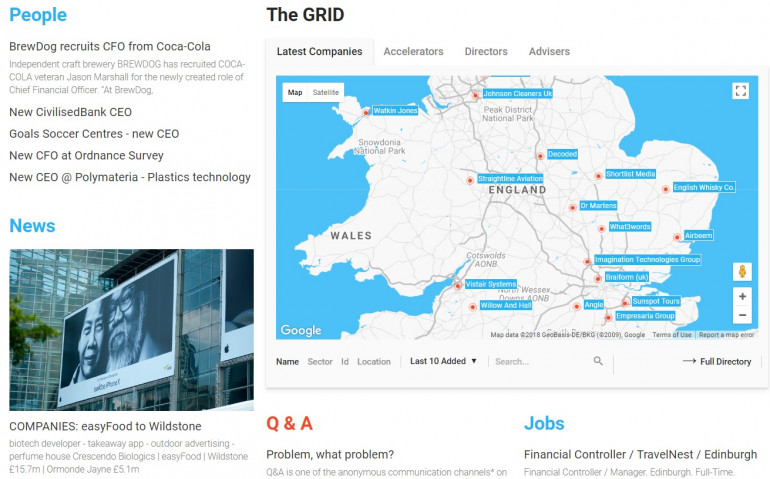Published by Directorzone Markets Ltd on July 3, 2017, 9:00 am in Knowledge, Market Info
Thursday February 14th 2019
EndsThursday February 14th 2019

Fintech, PSD2 + Edinburgh | Employee Share Schemes | Pitch for Chinese Cash | ID Fraud Targets Directors | Google Academy London | New Deep Tech Investor | Northern Powerhouse + Manchester | Bad SME Advice | Rocketspace lands in Islington | 32% of Global Disrupt 100 British
Digest of news and trends in the GRID marketplace in June 2017:
FINTECH, PSD2 + EDINBURGH
A fintech cluster greater than the sum of its parts
Elaine Ballantyne, City A.M. /City of Edinburgh Council. June 26.
Edinburgh will play a leading role in driving the UK’s £20bn fintech industry and shaping a fast-moving global industry. ….the UK's second largest financial services centre, and the fourth largest in Europe…
…. Edinburgh is home to CODEBASE, the UK’s largest technology incubator, as well as a vibrant, supportive digital community. …also SEEDHAUS, a dedicated incubator for fintech businesses, as well as the newly launched collaboration between RBS and ENTREPRENEURIAL SPARK, which has seen the launch of a new fintech hatchery at RBS’ Edinburgh headquarters.
Rising fintech stars such as NUCLEUS FINANCIAL, which has £12.5bn funds under management and more than 85,000 customers across the UK, AIM-listed accountancy software firm, FREEAGENT and personal financial assistant app, MONEY DASHBOARD were all founded and continue to thrive, here in Edinburgh. David Ferguson, Chief Executive, Nucleus Financial, …has grown his business from three people in 2006 to more than 180 today.
…the UNIVERSITY OF EDINBURGH School of Informatics …is aiming to train 100,000 data scientists over the next 10 years, ensuring a rich talent pool capable of supplying a growing fintech sector. The University has also just partnered with Hong Kong-based cryptocurrency research and development company, IOHK, to create a $1m Blockchain Technology Laboratory.
Regulation will fuel the revolution. The UK fintech sector is now preparing for the launch of the PSD2 and implementation of Open Banking Standards, which come into effect on 13 January 2018. The new legislation, which requires every bank and credit issuer in the UK to open their transactional banking data to regulated third parties, is seen as removing a significant barrier to the fintech revolution. It also reflects the fact that larger financial institutions have moved from a position of resistance to adoption, with fintech now considered central to their business strategy.
Smile, banking is being forced out into the great wide open
Laura Onita, The Sunday Times. June 25.
From next year, banks will have to share their customer data with “fintech” (financial technology) companies offering rival services. New entrants to the business banking market will be able to access small and medium-sized businesses’ financial history directly
“At the moment, small business owners don’t know if they are eligible for a loan. With open banking, you could be presented with five lenders for which you’ve already been screened for eligibility, making the process less painful and removing the uncertainty,” said Chris Gorst, who is leading the Open Up Challenge, a £5m prize fund run by the innovation charity NESTA.
The challenge, funded by the big banks, aims to increase competition and encourage fintechs to develop new services. It will initially give £50,000 each to 20 ventures, to be announced next month. These will also have early access to anonymised data sets, the largest-ever release by the big lenders. The high street incumbents could lose up to 43% of their payments-based revenues to fintech upstarts by 2020 under PSD2, according to a recent report.
One of the 150 entrants to the Open Up Challenge is Caroline Plumb, 38, also co-founder of the recruitment consultancy FRESHMINDS. She is boss of the online platform FLUIDLY, which promises to help small businesses get paid on time and improve their cashflow.
Another hopeful is Sam O’Connor. Last year he set up COCONUT, a bank account for freelancers and self- employed people, with Adam Goodall. The duo started their careers as accountants at PwC and sold their first fintech venture, PROCONFIRM, in 2014. Coconut came about because they were frustrated with the restrictions placed on the self-employed by traditional banks. “There’s really nothing happening on the banking side to support these guys,” said O’Connor, 34. “You start with this vision of being able to work from a beach in Bali and then you quickly start having admin tasks, such as sending out invoices, keeping expenses and knowing how much cash you’ve got. We’ll help with all that.”
EMPLOYEE SHARE SCHEMES
Handing out shares to staff? Be ready for a dog’s dinner
Kiki Loizou, The Sunday Times. June 18.
Henrietta Morrison, 48, has spent two years and about £150,000 trying to set up a share scheme for staff at LILY’S KITCHEN, the posh pet-food business she started in 2008. But, so far, granting equity to her 72-strong workforce has proved difficult:
1. Morrison planned to introduce the so-called Employee Shareholder Scheme (ESS), designed to allow staff to waive some employment rights in exchange for equity. Shares under ESS worth up to £50,000 were exempt from capital gains tax. However, ESS was scrapped in the November budget.
2. Her second choice was the Enterprise Management Incentive (EMI), where companies offer share options to workers who pay a discounted rate of 10% on capital gains if they cash in their stake. EMI companies must have less than £30m in assets and employ no more than 250 staff. Despite believing she met the criteria, Morrison claims HM Revenue & Customs told her that London-based Lily’s Kitchen was unlikely to qualify for EMI.
Awarding equity to staff has become a popular way for start-ups and smaller firms to attract and retain talent. PROSHARE, the body that supports employee ownership, says more entrepreneurs are seeking ways to hand out small stakes to those helping their ventures grow. “The UK has incredibly favourable legislation supporting employee share ownership,” said Gabbi Stopp of ProShare. But some business owners want more.
HMRC numbers show that there are about 11,000 companies with share schemes boasting tax incentives — more than double the total in 2001. Yet founders keen to reward staff this way still contend with unnecessary barriers and administration, said Morrison.
Some share plans allow staff to hold equity immediately, which can mean workers have voting rights and receive updates on the company’s performance. One of the more popular schemes, along with EMI, is the Share Incentive Plan (SIP), which lets company bosses grant free shares worth up to £3,600 to each worker a year. A recent ProShare report showed that, on average, bosses using this method tend to hand out much less: just £714 to each employee annually. Under SIP, workers are immediate shareholders and pay no income tax or national insurance on shares that are held for at least five years.
Another popular scheme is Save As You Earn (SAYE), which requires employees to pay up to £500 into a trust each month. After a set time the money can be used to buy discounted company shares. These “options” come into force only when a business is acquired or lists on the stock exchange. Shares are not subject to capital gains tax if they are transferred into an Isa or pension when bought.
Entrepreneur Will Wynne thinks workers should be entitled to the same tax benefits as traditional investors. The founder of flower delivery company ARENA FLOWERS and SMART PENSION, an auto-enrolment online platform, wants employees given the right to invest under the Enterprise Investment Scheme (EIS). This scheme, introduced in 1994, allows investors to reduce their income tax liability by 30% — the reward for accepting the risk of putting money (up to £1m a year) into young companies. “I don’t see why an angel [investor] should get those tax breaks and employees can’t,” said Wynne, 41, who has introduced the EMI scheme at both companies. “It seems fair to share the upside with those who help you build it,” he said.
But there are other ways to incentivise employees. “People jump to the conclusion that they must give share options,” said Caroline Sherrington, senior counsel at IGNITION LAW, which has advised start-up bosses. As a founder, “there are other ways to hold on to as much [equity] as possible. You can give staff bonuses or commission,” said Sherrington.
PITCH FOR CHINESE CASH
Airship aims for take-off in China
Andrew Lynch, The Sunday Times. June 18
Six handpicked British companies will pitch to a group of Chinese entrepreneurs at Battersea power station on Tuesday. The event is supported by Sir Richard Branson’s Virgin Group and by DBS Bank. ….the pitch day will be opened by Prince Michael of Kent.
More than 800 companies applied to take part in the event. The businesses on parade at the power station will be:
• Bedford-based HYBRID AIR VEHICLES, which is behind the giant Airlander,
• ONCIMMUNE, a life sciences developer working on early cancer detection;
• tech firm SAN FRANCISCO SCIENCE;
• STREAM TECHNOLOGIES, which works on the internet of things;
• SDCL, an investor in energy-efficient projects;
• NMITE, which is creating an engineering university, the first such institution in Britain for 40 years, it says.
The high-net-worth delegation will look at opportunities to invest in the British businesses or help to smooth their path in China in the future. Among the visitors are:
• Li Haojie, a mining tycoon who is developing a global powerboat race that he wants to bring to London;
• Tim Tse, founder of the Shanghai private members’ club House of Roosevelt and chairman of Roosevelt China Investments; and
• Yang Bin, founder of Shengyan Group, with interests in energy, mining and finance.
ID FRAUD TARGETS DIRECTORS
Fraudsters target UK directors through Companies House
Aime Williams, FT. June 14
Identity fraud has hit an all-time high, rising 68 per cent since 2010 to 173,000 individual cases last year.
One-fifth of all victims of identity fraud between 2012 and 2015 were company directors, who are being “disproportionately targeted”, according to research by CIFAS, which operates the National Fraud Database, and LEXISNEXIS Risk Solutions.
Barbara Judge, chairman of Cifas and the INSTITUTE OF DIRECTORS, said the availability of directors’ details in the Companies House register was partly to blame. Directors’ names, addresses and dates of birth are usually freely available to members of the public online. Alongside details logged with Companies House, directors were likely to have a media or online presence which included a photograph, she added, as well as details logged with banks, insurers, utilities and business services companies.
Directors are likely to attract the attention of fraudsters if they give the impression online of having significant assets and established careers, the report found, and fraudsters often make an attempt to obtain credit files as an easy source of further information.
Once they have assumed the identities of directors, fraudsters often use their details to sign up to multiple mobile phone contracts and to buy consumer goods online. In one-third of cases, the identities of directors were used to set up online retail accounts, compared with a fifth of cases more broadly. Lady Judge suggested that identity thieves relied on the tendency of business owners to hold mobile phone contracts for their employees, allowing them to purchase multiple phone contracts without raising alarm.
Fraudsters are less likely to use the identities of directors to sign up for credit or debit cards than they are for the average victim. Victims of identity fraud are more common in London and south-east England, the report found.
A fraudster obtained bank account details for LNK Motors from a cheque issued by Nicola Campbell, deputy director of used car dealership LNK MOTORS in Manchester…. before posing as her husband Paul Campbell by forging his driving licence. The person persuaded a major high street bank to add their name to the business bank account, before linking it to a personal account and draining it of nearly £20,000. The linking of the two accounts allowed the fraudster to gain full access to the account without needing to know the relevant passwords.
GOOGLE ACADEMY LONDON
Google's opening a huge new tech hub in London for training the UK in digital skills
Lynsey Barber, City A.M. June 13.
Google is opening the doors to a huge new space in London designed to give the nation training in vital digital skills.
The Academy will offer lessons to anyone, from schoolchildren to chief executives, at the 40,000 sq ft space in Victoria with input from Google staff and other industry experts.
The opening comes amid London Tech Week and after the tech company's promise to offer digital skills training to everyone in the UK for free. It is also ploughing more than £1bn into a new headquarters in Kings Cross which is due to open next year, creating up to 3,000 new jobs by 2020.
The space will this week host the Leaders in Tech conference with speakers including Sir Martin Sorrell, Eileen Burbidge and Ronan Harris, Google UK managing director, as part of London Tech Week. The Academy is also working with the Prince's Trust to run a video training programme.
NEW DEEP TECH INVESTOR
Seed fund raises $60m to back European tech start-ups
John Thornhill, FT. June 11
A pan-European seed fund formed by Brent Hoberman has raised $60m to invest in technology start-ups across the region. As well as co-founding lastminute.com, the online travel site, Mr Hoberman co-founded FOUNDERS FORUM, a private network of tech entrepreneurs, which is holding its annual meeting in London this week.
FIRSTMINUTE CAPITAL is being backed by 23 founders of leading technology companies as well as an anchor investment from ATOMICO, the London-based venture capital fund run by Niklas Zennström, the co-founder of Skype. Firstminute’s co-founder is Spencer Crawley who will become head of investments. Investors include the co-founders of some of Europe’s most successful tech companies, including SKYPE, SUPERCELL, BETFAIR, TRULIA, SKYSCANNER, NET-A-PORTER and BLABLACAR. The fund has also drawn in several family offices and a clutch of corporate executives, including Lord Davies, former chairman of Standard Chartered bank.
Mr Hoberman said Firstminute differed from other early stage funds in that it would be able to tap into such a broad community of supporting entrepreneurs to offer advice. Firstminute will aim to make investments of up to $750,000 in a range of tech companies across Europe, focusing heavily on “deep tech” businesses in the fields of robotics, artificial intelligence and the internet of things.
The European tech sector was last year chilled by the effects of the Brexit vote but has been warming up again this year. Europe has lagged far behind the US and China in developing its start-up sector and has been slow to realise the benefits of a digital single market.
NORTHERN POWERHOUSE + MANCHESTER
Kiki Loizou, The Sunday Times June 11
Manchester’s entrepreneurial spark is on the rise, with more than 8,000 start-ups created there last year, according to Companies House.
Foreign direct investment is on the rise, thanks in part to the Northern Powerhouse strategy. There were 90 foreign direct investment deals in northwest England last year, according to the professional services firm EY. More than 50 of those projects are in Manchester.
The city is also set to be the biggest winner from the £556m pledged for the Northern Powerhouse by Theresa May in January …which aims to help the cities, towns and rural communities of the north of England and Wales to become an economic force. GREATER MANCHESTER LOCAL ENTERPRISE PARTNERSHIP will receive more than £130m of the funding injection.
There is also the £400m NORTHERN POWERHOUSE INVESTMENT FUND (NPIF), announced 18 months ago. It will provide loans and equity finance of up to £2m for small and medium-sized companies. Grant Peggie of the state-owned BRITISH BUSINESS BANK, manages the NPIF. The European Union is providing more than half the money for the NPIF. This has sparked concerns about the future because of the Brexit vote.
But there has been frustration over the length of time it has taken to get up and running. It opened for business in February, and made its first investments in April. Among them was Manchester-based RED SECURITY SOLUTIONS, a CCTV provider, which has received £100,000.
There is other assistance for northern England, including the EU-backed JEREMIE programme, which provides a mixture of equity and debt finance.
A well-developed investor community is still some way off, though. For Luke Massie, this was highlighted by a recent trip to Silicon Valley. “The cultural difference is upsetting,” said Massie, who started VIBE TICKETS in 2013. The app lets users buy and sell event tickets without a fee. He now has 60,000 users and 16 staff, four of them in London. Preston-based Massie, 24, is determined to build a global empire from the north of England.
BAD SME ADVICE
Bad advice for business owners can prove costly
Brian Groom, FT. June 5
Entrepreneurs risk making expensive mistakes if they listen to the wrong professionals. A 2015 survey of 125 small businesses by UK insurer Direct Line found that one in six thought they had suffered from poor professional advice over the previous 12 months, with an average cost to the business of almost £21,000.
• 44 per cent of companies surveyed blamed information technology consultants,
• specialists in management (34 per cent)
• marketing (32 per cent)
• property (23 per cent)
• communications (16 per cent)
• Accountants 9 per cent
• advertising consultants (8 per cent)
• lawyers (6 per cent).
Lavina Bonar, founder of SIZERS, which provides foam inserts to make loose shoes fit better, hired an accountant in London to help her company grow. He missed tax deadlines and gave the wrong instructions on what allowances could be claimed, and Ms Bonar is now seeking a refund.
Maulik Sailor, co-founder of INNOVIFY, a London-based technology start-up incubator, says his company hired an accountancy firm that marketed itself online as specialising in tech start-ups, but he was gravely disappointed. Innovify raised £220,000 on crowdfunding platform SEEDRS, based on the accountants’ advice that the fundraising would qualify for generous tax breaks under the UK government’s Enterprise Investment Scheme. But then notification came from HM Revenue & Customs that Innovify had not provided enough information to qualify. “Our accountants never managed to do all the paperwork properly in time. We had to cancel our fundraising and redo it as a non-EIS funding round. We only managed to raise £173,000 and that after putting in money from our own pocket,” Mr Sailor says.
Innovify is negotiating over compensation and has taken great care choosing a replacement. It appealed to start-up networks for recommendations, asked 10 to 15 accountancy firms detailed questions on what they could do and the fees they would charge, and interviewed three before choosing one.
A danger in the UK has been advice that ensnares entrepreneurs in schemes that fall foul of HMRC’s clampdown on tax avoidance. Karen Millen, a prominent fashion designer, was made bankrupt recently after failing to pay £6m to HMRC in connection with a tax avoidance scheme.
Clive Lewis, head of enterprise at the INSTITUTE OF CHARTERED ACCOUNTANTS IN ENGLAND AND WALES …advice to entrepreneurs is to seek an accountancy firm of a similar size to his or her own business, unless the entrepreneur has ambitious plans for growth, in which case it might be necessary to find a larger firm with experience of raising equity finance.
Entrepreneurs should also seek referrals and recommendations from other business owners with similar experiences. Phillip Kim, associate professor of entrepreneurship at Babson College in Massachusetts, says entrepreneurs benefit from networking and being part of local business associations, where they can get to know advisers before they need them. They should also seek referrals from their personal and professional networks.
ROCKETSPACE LANDS IN ISLINGTON
RocketSpace powers into London to hunt for next $1 billion tech 'unicorn'
Jamie Nimmo, The Evening Standard. June 2
ROCKETSPACE, which has helped to nurture some of the biggest so-called unicorns such as UBER and SPOTIFY at its San Francisco workspace, is opening the doors on Tuesday to its new state-of-the-art facility at Royal Bank of Scotland’s old cash-counting operations in Angel. It will give tech startups a place to work, and allow them to mix with other companies and tap into RocketSpace’s network of blue-chip companies.
RocketSpace was founded by Scottish entrepreneur Duncan Logan, but the UK business will be run by British diplomat Priya Guha, the former British Consul-General in San Francisco. “San Francisco is a campus where we’ve had 18 unicorns – Uber, BLIPPAR, SUPERCELL, others coming through the door. While we would never want to take full credit for those companies’ success, it shows the environment we bring to the table works,” Guha said. In the six years RocketSpace’s San Francisco campus has been running, more than 90% of the companies are still in existence, which Guha calls “an incredible statistic for the world of startups”.
32% OF GLOBAL DISRUPT 100 BRITISH
Lynsey Barber, City A.M. June 1
Top 10 Disrupt100 most disruptive startups:
1. Storedot - battery technology
2. GRAPHCORE - AI chips
3. Grail - early cancer detection
4. Bugcrowd - hacker bounties
5. Jamii - health insurance
6. AID:TECH - transparent cash flows
7. GOHENRY - money management for kids
8. Simplify - wireless provider
9. SIGNAL MEDIA - fighting fake news
10. Be My Eyes - helping blind see
A Bristol-based startup developing computer chips for artificial intelligence, an app for helping kids manage money, and a fintech just backed by AVIVA, are among the UK startups to be named the most disruptive in the world. AI chip firm GRAPHCORE was ranked second in the annual list identifying companies with the potential to "influence, change or create new global markets", pipped to the top spot only by Israeli battery startup STOREDOT.
Graphcore made headlines after landing £30m from investors late last year, including AMADEUS CAPITAL, the venture firm of ARM founder Herman Hauser. It produces chips that can process machine learning faster and more efficiently and has produced stunning visualisations of what "AI brains" look like.
Kids money app GoHenry ranked seventh and insurance startup NEOS, which picked up £5m in funding from Aviva among others just last week, was ranked eleventh.
AID:TECH, a company using blockchain to help distribute aid more transparently, a new media company tackling fake news, Signal Media, also ranked highly along with ULTRAHAPTICS, a firm bringing the sensation of haptic feedback on smartphones to people's skins. They ranked sixth, ninth and twelfth respectively.
Firms from the UK represented a third of Tallt Ventures Disrupt 100 index - more than any other location in the world.
• Graphcore (2)
• Aid:Tech (6)
• GoHenry (7)
• Signal Media (9)
• Neos (11)
• Ultrahaptics (12)
• Cambridge Intelligence (15)
• COGNITIONX (16)
• HEALX (25)
• Apolitical (26)
• Grabyo (32)
• Suade (34)
• Hadean (38)
• Boiler Room (39)
• Delos (43)
• Hackajob (47)
• Skipping Rocks Lab (56)
• LegalBeagles (60)
• STREETBEES (61)
• Satavia (62)
• Vastari (63)
• Live Better With (68)
• Concured (69)
• Avalon AI (71)
• BLAZE (72)
• MIXCLOUD (75)
• Appy Feet (76)
• Firef.ly (77)
• Pointr (78)
• Firefly (81)
• Appattic (87)
• Curation Corp (97)
The ranking, chosen by executives from top tech companies, including Uber and Google, venture capitalists and other experts working with entrepreneurs and technology, also identified the rise of healthcare and AI as areas ripe for disruption.
Health accounted for 17 per cent of the sectors, followed by 14 per cent working on disrupting general business and 10 per cent finance. Startups specialising in AI accounted for the largest area of tech only behind mobile. Tallt Ventures also calculated seven per cent have grown within or as a result of partnerships with corporates.
...founder of the Disrupt100, Matt Connolly.
Also making the top 10 is GRAIL, a US firm working on detecting cancer earlier which raised $900m from investors in March. It is conducting trials from which it hopes to develop products such as a wristband that can detect the disease.
Meanwhile, STOREDOT is working on technology that could charge phone batteries from zero to 100 per cent in just 30 seconds. It has raised $66m from investors who include billionaire Chelsea owner Roman Abramovich.
FULL LIST: http://disrupt100.com/#disrupt100
Judges:
• Tom Goodwin, EVP, Head Of Innovation, Zenith
• Paul Adams, Head of Education, Virgin Startup
• Kieran Harte, Head of Cities, Uber Midlands & South West UK, Wales And Ireland
• Warwick Hill, CEO, Microsoft Ventures
• Parul Green, Head of M&A; and Innovation, Axa UK
• Autumn Bryan, Head of Agency Strategy and Insights, Google Uk
• Bill Liao, Founder, Rebelbio
• Phil Bates, Architect, Oracle Cloud
• Matt Connolly, Founder and CEO, Tällt Ventures
• Andy Mccartney, Co-Founder, Whitespace Ventures
• Dr. Junaid Bajwa, GP, Director of Healthcare Services, MSD (UK)
• Kerry Ritz, Non-Executive Director (NED), early-stage and high growth companies
• Sam Barton, Enterprise Manager, KPMG
• Dan Wilkinson, Executive Manager, Customer Technologies, Suncorp Group
• Tom Butterworth, Director of Entrepreneur Banking, Silicon Valley Bank
• Emma Sinclair, Co-Founder, Enterprisejungle
• Sam Kelly, Managing Director, AKQA
• David Fogel, Co-Founder and Investor, Accelerated Digital Ventures.








